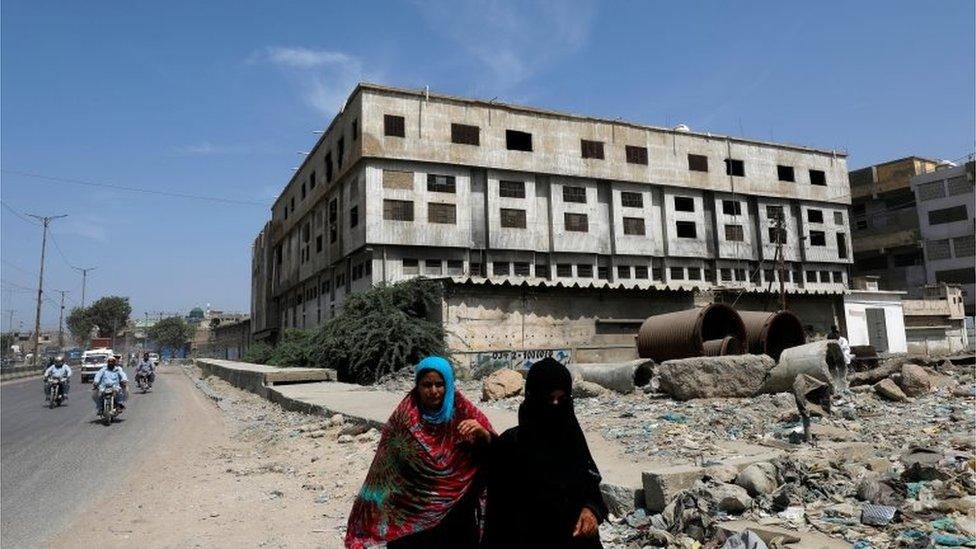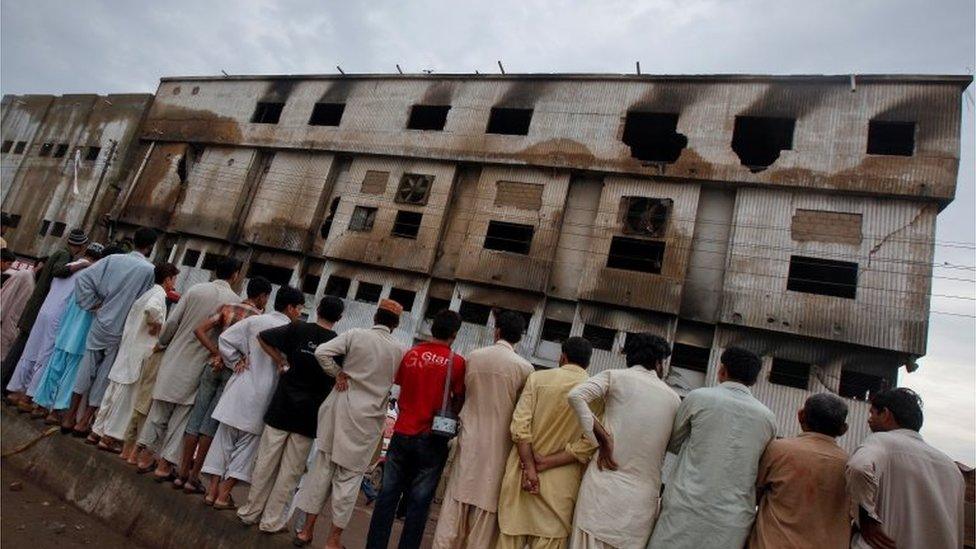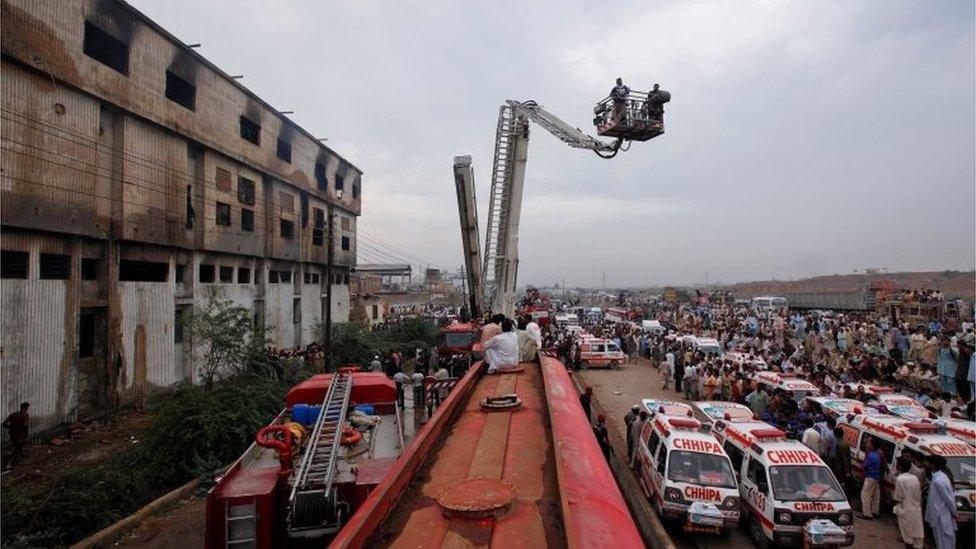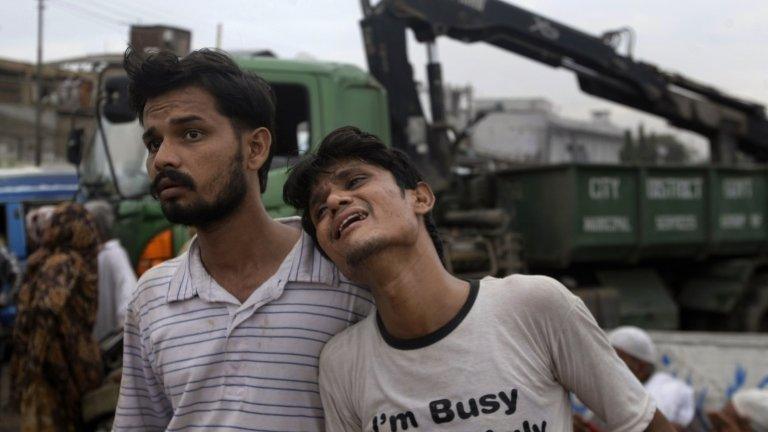Pakistan fire: Two to hang for Karachi garment factory inferno
- Published

The charred remains of the abandoned factory are a reminder of what happened
A court in Karachi has sentenced two men to death for arson after finding them guilty of starting Pakistan's deadliest industrial fire, which killed some 260 people in 2012.
The men were found to have set a garment factory ablaze because its owners had not paid extortion money.
They were affiliated with the MQM party, which was in power in the city at the time, the court said.
Hundreds were trapped inside the building which had no fire exits.
Prosecutors took evidence from more than 400 witnesses. The investigation into the fire called it an act of organised terrorism, external.
Many of the victims were charred beyond recognition. Others died or broke bones trying to jump to safety.
What happened in the fire?
The blaze at the Ali Enterprises factory in the Baldia town area of the commercial capital began in the afternoon of 11 September 2012 and raged for 15 hours. Some 40 firefighting vehicles attended.
More than 24 hours after the inferno began rescuers were still battling to reach the dead and injured inside. In all, about 500 workers had been inside the factory when the fire broke out.
Many workers jumped from the upper floors. Others could not because of metal grilles on the windows. Survivors said doorways and stairs were stuffed with stacks of finished garments.
The BBC's Orla Guerin says the factory windows were barred, leaving most with no way out
Officials said the factory was crammed with combustible materials, including piles of clothes and chemicals.
People trapped inside the building frantically rang their friends and relatives as flames engulfed it.
Outside, crowds of shouting and sobbing relatives gathered for news as rescuers pulled out body after body.
In its verdict, the court in Karachi said 264 people had been killed in the fire, and 60 injured.
What has been the reaction to the verdicts?
Some relatives told BBC Urdu's Riaz Sohail they felt justice had been only half done - as the factory owners, Arshad and Shahid Bhaila, had not also been held responsible for the loss of life.
The brothers were initially arrested but later released on bail after which they moved abroad. They were questioned by investigators via video link from Dubai .

Relatives raced to the factory after word of the blaze broke out
"Why didn't the owners order the factory closed, knowing that the MQM's extortionists had the freedom and the capacity to do what they did?" asked Saeeda Bibi, who lost her 18-year-old son Ayan in the inferno.
Ayan had been her only child - he was planning to quit his job but was waiting for his final salary payment which had been delayed.
Ms Bibi also wanted to know what had happened to a 90m rupee compensation package that was promised to those affected but she said had not materialised.
Faisal Ahmad, the father of another 18-year-old killed in the fire, said when he reached the factory on the day of the blaze, its exit was locked.
"I asked the manager to unlock the door but he didn't do it. Had he kept it open, some lives may have been saved."
How was arson proved?
The fire in Baldia was initially thought to have been an accident. Pakistan is prone to industrial disasters, often as a result of poor construction, or lax safety standards and enforcement.
The subsequent discovery that it was an arson attack provided an insight into the grim nexus between political workers and serious criminality in the city, reports the BBC's Secunder Kermani in Islamabad.

It took nearly a day for emergency services to put the fire out
The investigation report said the sum demanded for "protection" was 200m Pakistani rupees ($1.2m). In September 2019, one of the factory owners confirmed this in his witness statement to the court.
Explaining why he thought the fire was not accidental, he said it first broke out in the basement, and then on the upper floor while nothing happened on the mezzanine floor in between.
After early investigations focused on whether or not the owners had been negligent, a key witness told officials members of the city's powerful Muttahida Qaumi Movement had been trying to extort money from the factory - and were behind the fire.
The MQM's current leadership denies any involvement with the fire. It is now part of Pakistan's governing coalition, having split into factions in 2017.
No date has been set for the hanging of Abdul Rehman, also known as Bhola, and his associate Zubair Charya, the men who were sentenced to death. They have the right to appeal.
Bhola was the MQM's official responsible for the Baldia area, the court heard. In a 2016 statement to the magistrate, he admitted asking Charya to set the factory on fire on the orders of a more senior MQM figure, who is still being sought by police.
Bhola was arrested with Interpol's help, while Charya escaped to Saudi Arabia and was arrested when he flew back to Karachi some years ago later.
In addition to the two death sentences handed down, the court gave four factory guards life in jail after finding them complicit in the crime.
Four others were acquitted, including the then-provincial minister for industries, Rauf Siddiqui, an MQM member. All the defendants had denied the charges against them.
- Published12 September 2012
